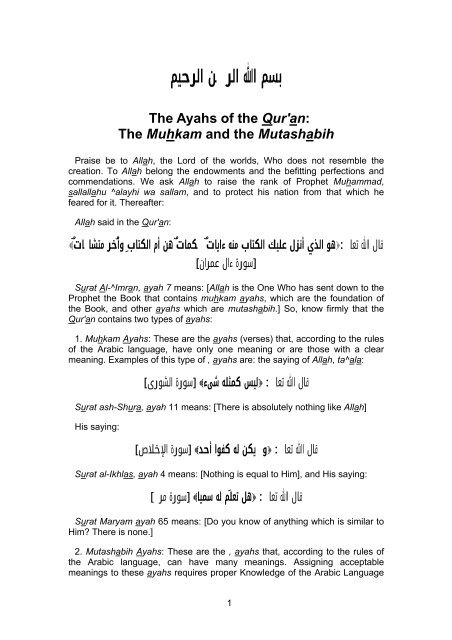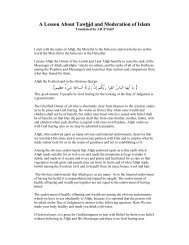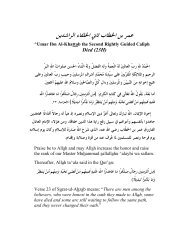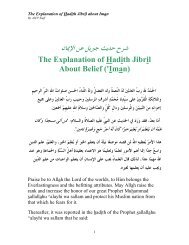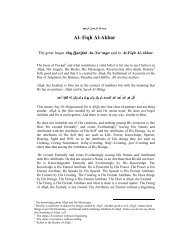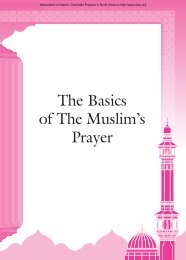The Ayahs of the Qur'an: The Muhkam and the Mutashabih
The Ayahs of the Qur'an: The Muhkam and the Mutashabih
The Ayahs of the Qur'an: The Muhkam and the Mutashabih
Create successful ePaper yourself
Turn your PDF publications into a flip-book with our unique Google optimized e-Paper software.
بسم االله الرحمن الرحيم<strong>The</strong> <strong>Ayahs</strong> <strong>of</strong> <strong>the</strong> <strong>Qur'an</strong>:<strong>The</strong> <strong>Muhkam</strong> <strong>and</strong> <strong>the</strong> <strong>Mutashabih</strong>Praise be to Allah, <strong>the</strong> Lord <strong>of</strong> <strong>the</strong> worlds, Who does not resemble <strong>the</strong>creation. To Allah belong <strong>the</strong> endowments <strong>and</strong> <strong>the</strong> befitting perfections <strong>and</strong>commendations. We ask Allah to raise <strong>the</strong> rank <strong>of</strong> Prophet Muhammad,sallallahu ^alayhi wa sallam, <strong>and</strong> to protect his nation from that which hefeared for it. <strong>The</strong>reafter:Allah said in <strong>the</strong> <strong>Qur'an</strong>:قال االله تعالى:هو الذي أنزل عليك الكتاب منه ءاياتٌ محكماتٌ هن أم الكتاب ِ وأ ُخر متشااتٌ[سورة ءال عمران]Surat Al-^Imran, ayah 7 means: [Allah is <strong>the</strong> One Who has sent down to <strong>the</strong>Prophet <strong>the</strong> Book that contains muhkam ayahs, which are <strong>the</strong> foundation <strong>of</strong><strong>the</strong> Book, <strong>and</strong> o<strong>the</strong>r ayahs which are mutashabih.] So, know firmly that <strong>the</strong><strong>Qur'an</strong> contains two types <strong>of</strong> ayahs:1. <strong>Muhkam</strong> <strong>Ayahs</strong>: <strong>The</strong>se are <strong>the</strong> ayahs (verses) that, according to <strong>the</strong> rules<strong>of</strong> <strong>the</strong> Arabic language, have only one meaning or are those with a clearmeaning. Examples <strong>of</strong> this type <strong>of</strong> , ayahs are: <strong>the</strong> saying <strong>of</strong> Allah, ta^ala:قال االله تعالى: ليس كمثله شىء [سورة الشورى]Surat ash-Shura, ayah 11 means: [<strong>The</strong>re is absolutely nothing like Allah]His saying:قال االله تعالى: ولم يكن له كفوا أحد [سورة الإخلاص]Surat al-Ikhlas, ayah 4 means: [Nothing is equal to Him], <strong>and</strong> His saying:قال االله تعالى: هل تعل َم له سميا [سورة مريم]Surat Maryam ayah 65 means: [Do you know <strong>of</strong> anything which is similar toHim? <strong>The</strong>re is none.]2. <strong>Mutashabih</strong> <strong>Ayahs</strong>: <strong>The</strong>se are <strong>the</strong> , ayahs that, according to <strong>the</strong> rules <strong>of</strong><strong>the</strong> Arabic language, can have many meanings. Assigning acceptablemeanings to <strong>the</strong>se ayahs requires proper Knowledge <strong>of</strong> <strong>the</strong> Arabic Language1
<strong>and</strong> thorough thinking. Examples <strong>of</strong> this type <strong>of</strong> ayahs are: <strong>the</strong> saying <strong>of</strong> Allah,ta^ala, in Surat Taha, ayah 5:قال االله تعالى: الرحمن على العرش استوى [سورة طه]<strong>and</strong> His saying in Surat Fatir, ayah 10:قال االله تعالى: إليه يصعد الك َلم الطيب [سورة فاطر]According to <strong>the</strong> rules <strong>of</strong> <strong>the</strong> Arabic language, <strong>the</strong>se ayahs are mutashabih;so <strong>the</strong>y can have many meanings. Assigning meanings to <strong>the</strong>m must be donein a manner which complies with <strong>the</strong> Arabic language <strong>and</strong> <strong>the</strong> Religion. <strong>The</strong>assigned meanings must not contradict <strong>the</strong> ayahs that are muhkam. Surely,<strong>the</strong> ayahs <strong>of</strong> <strong>the</strong> <strong>Qur'an</strong> do not contradict one ano<strong>the</strong>r! Likewise, <strong>the</strong> hadiths(sayings <strong>of</strong> <strong>the</strong> Prophet, sallallahu ^alayhi wa sallam,) nei<strong>the</strong>r contradict oneano<strong>the</strong>r, nor <strong>the</strong> ayahs <strong>of</strong> <strong>the</strong> <strong>Qur'an</strong>.<strong>The</strong>re are two methodologies for explaining <strong>the</strong> mutashabih ayahs <strong>of</strong> <strong>the</strong><strong>Qur'an</strong>, <strong>and</strong> both <strong>of</strong> <strong>the</strong>m are valid. <strong>The</strong>y are:1. <strong>The</strong> Methodology <strong>of</strong> <strong>the</strong> Salaf: <strong>The</strong> Salaf were <strong>the</strong> scholars who livedduring <strong>the</strong> first three centuries after <strong>the</strong> Hijrah (Immigration) <strong>of</strong> <strong>the</strong> Prophet,sallallahu ^alayhi wa sallam. Most <strong>of</strong>ten, this methodology consisted <strong>of</strong> givinggeneral explanations, since <strong>the</strong> scholars <strong>of</strong> <strong>the</strong> Salaf believed that <strong>the</strong>seayahs have meanings befitting to <strong>the</strong> perfection <strong>of</strong> Allah. Ra<strong>the</strong>r than sayingwhat <strong>the</strong>se meanings are, <strong>the</strong>y referred <strong>the</strong>se mutashabih ayahs to <strong>the</strong>muhkam ayahs. A good example is <strong>the</strong> saying <strong>of</strong> Imam ash-Shafi^iyy:قال الإمام الشافعى رضى االله عنه: "ءَامنت بما جاء عن االله على مراد االله،وبما جاءَ عن رسول االله على مراد رسول االله".which means: "I believe in what Allah revealed according to <strong>the</strong> meaningthat Allah willed, <strong>and</strong> in what <strong>the</strong> Messenger <strong>of</strong> Allah conveyed according to<strong>the</strong> meaning that <strong>the</strong> Messenger <strong>of</strong> Allah willed." In o<strong>the</strong>r words, <strong>the</strong> properbefitting meanings are not according to <strong>the</strong> sensuous <strong>and</strong> physical meaningsthat delusions would lead to, such as places, shapes, limbs, movements,sitting, colors, directions, smiling, laughing, or any o<strong>the</strong>r meanings which arenot permissible to be attributed to Allah.Fur<strong>the</strong>rmore, <strong>the</strong> Arabs during <strong>the</strong> first three Hijriyy centuries spoke <strong>the</strong>Arabic language with a natural disposition <strong>and</strong> great eloquence. <strong>The</strong>irunderst<strong>and</strong>ing <strong>of</strong> its meanings was so sharp that <strong>the</strong>y did not need to attributespecific meanings to <strong>the</strong> mutashabih ayahs. Instead, <strong>the</strong>y understood that<strong>the</strong>se ayahs have meanings that befit Allah, <strong>and</strong> that it is impossible that <strong>the</strong>ywould have sensuous <strong>and</strong> physical meanings which do not befit Allah.Never<strong>the</strong>less, it is well known that some <strong>of</strong> <strong>the</strong> scholars <strong>of</strong> <strong>the</strong> Salaf didattribute specific meanings to mutashabih ayahs. In his Sahih, in <strong>the</strong> chapter2
Tafsirul- <strong>Qur'an</strong> (Explanation <strong>of</strong> <strong>the</strong> <strong>Qur'an</strong>,) Imam al-Bukhariyy attributed aspecific meaning to <strong>the</strong> term "illa wajhahu" in Surat al-Qasas, ayah 88. Hesaid: "illa mulkahu," i.e., he said that word "wajh", which is an attribute <strong>of</strong>Allah, means "Mulk" or "Dominion."قال االله تعالى: كل ُّ شىءٍ هالكٌ إلا وجههقال الإمام البخارى فى تفسيرها: "إلا مل ْك َه"2. <strong>The</strong> Methodology <strong>of</strong> <strong>the</strong> Khalaf: <strong>The</strong> Khalaf were <strong>the</strong> scholars who livedafter <strong>the</strong> first three centuries after <strong>the</strong> Hijrah. For <strong>the</strong> most part, thismethodology consisted <strong>of</strong> giving specific meanings to <strong>the</strong> mutashabih ayahs.<strong>The</strong> scholars <strong>of</strong> <strong>the</strong> Khalaf lived at a time when <strong>the</strong> people started to lose <strong>the</strong>irnatural disposition for <strong>the</strong> Arabic language. Seeing that <strong>the</strong> people hadbecome weaker in <strong>the</strong> language, <strong>the</strong> scholars <strong>of</strong> <strong>the</strong> Khalaf feared that thosewith perversity in <strong>the</strong>ir hearts would read meanings into <strong>the</strong> mutashabih ayahswhich do not befit Allah. <strong>The</strong>y feared what is mentioned in Surat Al ^Imran,ayah 7. Allah said:قال االله تعالى: فأما الذين في قلوم زيغ ٌ فيتبعون ما تشابه منه ابتغاء الفتنة وابتغاء تأويله[سورة ءال عمران]which means: [Those who have perversity in <strong>the</strong>ir hearts, follow <strong>the</strong>mutashabih ayahs, seeking discord <strong>and</strong> searching for unbefitting meaningsbased on <strong>the</strong>ir delusions.] In order to protect <strong>the</strong> creed <strong>of</strong> Islam, <strong>the</strong> scholars<strong>of</strong> <strong>the</strong> Khalaf followed <strong>the</strong> example <strong>of</strong> <strong>the</strong> scholars <strong>of</strong> <strong>the</strong> Salaf who gavespecific meanings to <strong>the</strong> mutashabih ayahs. Referring <strong>the</strong>m to <strong>the</strong> muhkamayahs, <strong>the</strong>y gave specific meanings to <strong>the</strong> mutashabih ayahs in compliancewith <strong>the</strong> language <strong>and</strong> with <strong>the</strong> Religion. <strong>The</strong>y gave correct, acceptablemeanings to <strong>the</strong> mutashabih ayahs. Allah said:قال االله تعالى: وما يعلم تأويله إلا االله والراسخون في العلم يقولون ءامنا به كل من عند ربنا ومايذكر إلا أولوا الألباب [سورة ءال عمران],Ayah 7 in Surat Al ^Imran means: [No one knows <strong>the</strong>ir true meaningsexcept Allah <strong>and</strong> those who are firmly rooted in <strong>the</strong> knowledge <strong>of</strong> <strong>the</strong> Religion.<strong>The</strong> latter {i.e, those firmly rooted in <strong>the</strong> knowledge} say: "We believe in it, all<strong>of</strong> it is from our Lord" <strong>and</strong> none will underst<strong>and</strong> <strong>the</strong> message, except <strong>the</strong> men<strong>of</strong> comprehension.] In relation to this ayah, Ibn ^Abbas said: (This is naratedby hafidh az-Zabidiyy in "Ithaf as-Sadah al-Muttaqin") "I am one <strong>of</strong> those whoare firmly rooted in <strong>the</strong> knowledge <strong>of</strong> <strong>the</strong> Religion." It is well known that Ibn^Abbas is generally regarded as being foremost among <strong>the</strong> Companions in<strong>the</strong> explanation <strong>of</strong> <strong>the</strong> meanings <strong>of</strong> <strong>the</strong> ayahs <strong>of</strong> <strong>the</strong> <strong>Qur'an</strong>.Among those who have perversity in <strong>the</strong>ir hearts are <strong>the</strong> mushabbihah,those who liken Allah to His creation. <strong>The</strong> followers <strong>of</strong> Ibn Taymiyah <strong>and</strong>Muhammad Ibn ^Abdil-Wahhab are among <strong>the</strong> group <strong>of</strong> <strong>the</strong> mushabbihah.3
<strong>The</strong>y falsely claim that it is prohibited to make ta'wil, i.e., to assign specificmeanings to <strong>the</strong> mutashabih ayahs <strong>and</strong> especially to those that pertain to <strong>the</strong>attributes <strong>of</strong> Allah. Moreover, <strong>the</strong>y innovated a devilish rule which states thatassigning specific meanings to <strong>the</strong> ayahs would lead to cancelling <strong>the</strong>seattributes <strong>of</strong> Allah. <strong>The</strong>ir claim leads to interpretations <strong>of</strong> <strong>the</strong> , ayahs <strong>of</strong> <strong>the</strong><strong>Qur'an</strong> that contradict one ano<strong>the</strong>r. It leads to interpretations <strong>of</strong> <strong>the</strong> hadiths <strong>of</strong><strong>the</strong> Prophet that contradict one ano<strong>the</strong>r <strong>and</strong> contradict <strong>the</strong> ayahs <strong>of</strong> <strong>the</strong><strong>Qur'an</strong>. Fur<strong>the</strong>rmore, <strong>the</strong>ir claim accuses <strong>the</strong> Islamic scholars <strong>of</strong> <strong>the</strong> Salaf <strong>and</strong><strong>the</strong> Khalaf <strong>of</strong> denying <strong>the</strong> attributes <strong>of</strong> Allah, which unjustly makes <strong>the</strong>mblasphemers. Such scholars include: Ibn ^Abbas, Sufyan ath-Thawriyy,Mujahid, Sa^id Ibn Jubayr, Malik, Ahmad, al-Bukhariyy, an-Nawawiyy, IbnRajab al-Hanbaliyy, Ibn-ul-Jawziyy, Ibn Hajar al-^Asqalaniyy, al-Bayhaqiyy,Abul-Fadl at-Tamimiyy, ^Abdul-Qahir al-Baghdadiyy, <strong>the</strong> linguist <strong>and</strong> scholar<strong>of</strong> Hadith Murtada az-Zabidiyy, <strong>and</strong> o<strong>the</strong>rs.Foremost, by <strong>the</strong>ir claim <strong>the</strong> mushabbihah are contradicting <strong>the</strong> Prophet,sallallahu ^alayhi wa sallam. Al-Bukhariyy related that <strong>the</strong> Prophet made adu^a’ (a supplication) for Ibn ^Abbas. <strong>The</strong> Prophet said:دعا رسول االله لابن عباس: "الل ّهم عل ّمه الحك ْمة َ وتأ ْويل َ الكتاب"رواه ابن ماجه ورواه البخارى وغيره.which means:
^Abbas <strong>and</strong> Ibn ^Umar. Yet, <strong>the</strong> mushabbihah insist on taking <strong>the</strong> literalmeaning <strong>and</strong> attribute `<strong>the</strong> shin' to Allah, by saying saq literally means ‘shin.'Such a mistranslation is given in <strong>the</strong> so-called "<strong>The</strong> Noble <strong>Qur'an</strong> " by M.Khan<strong>and</strong> M. Al-Hilali. This English translation is full <strong>of</strong> misinterpretations which areblasphemous, as <strong>the</strong>y amount to likening Allah to His creations.In Surat -ul-Baqarah, ayah 115, Allah said:قال االله تعالى: فأينما تولوا ف َث َم وجه االله [سورة البقرة]Imam Mujahid, <strong>the</strong> student <strong>of</strong> Ibn ^Abbas, said that <strong>the</strong> word wajh means‘qiblah,' i.e., <strong>the</strong> direction <strong>of</strong> praying during <strong>the</strong> voluntary prayers whiletravelling <strong>and</strong> riding an animal. Yet, <strong>the</strong> mushabbihah insist on taking <strong>the</strong>literal meaning; <strong>the</strong>y claim <strong>the</strong> term, wajh, means ‘face.'Similarly, if ayah 12 in Surat at-Tahrim:قال االله تعالى: فنفخنا فيه من روحنا [سورة التحريم]were taken literally, it would mean that Allah blew part <strong>of</strong> His Soul into ^Isa(Jesus.) However, <strong>the</strong> scholars said this ayah means: [Allah ordered Jibril toblow into ^Isa <strong>the</strong> soul which is honorable to Allah.]Also, if ayah 75 in Surat Sad:قال االله تعالى: ما منعك أن تسجد لما خلقت بيدي [سورة ص]were taken literally, it would mean: "What has stopped you from performingsujud to what I have created with My h<strong>and</strong>s?" However, <strong>the</strong> scholars said that<strong>the</strong> word ‘yadayn' in <strong>the</strong> ayah means <strong>the</strong> ‘care' <strong>of</strong> Allah. Yet, <strong>the</strong> mushabbihahinsist that yadayn means h<strong>and</strong>s.Likewise, if ayah 35 in Surat an-Nur:قال االله تعالى: االله نور السموات والأرض [سورة النور]were taken literally, it would mean: "Allah is <strong>the</strong> light <strong>of</strong> <strong>the</strong> heavens <strong>and</strong> <strong>the</strong>Earth." <strong>The</strong> scholars, such as al-Bayhaqiyy <strong>and</strong> at-Tabariyy related that^Abdullah Ibn ^Abbas said that this ayah means: [Allah is <strong>the</strong> Creator <strong>of</strong>guidance in <strong>the</strong> occupants <strong>of</strong> <strong>the</strong> heavens <strong>and</strong> <strong>the</strong> occupants <strong>of</strong> <strong>the</strong> Earth.]However, <strong>the</strong> mushabbihah insist on taking <strong>the</strong> literal meaning <strong>and</strong> say thatAllah is `light.'Again, if ayah 22 in Surat al-Fajr were taken literally:5
قال االله تعالى: وجاء ربك والملك صفا صفا [سورة الفجر]it would mean: "Your Lord comes." It was related that Imam Ahmad IbnHambal, who is among <strong>the</strong> authorities <strong>of</strong> <strong>the</strong> Salaf, said that this ayah means:[An indication <strong>of</strong> <strong>the</strong> Power <strong>of</strong> Allah has come.] In his book, Manaqib Ahmad,Hafidh Imam al-Bayhaqiyy, established that <strong>the</strong> sanad (chain) <strong>of</strong> narrators issahih (au<strong>the</strong>ntic). Also, Ibn al-Jawziyy al- Hambaliyy, one <strong>of</strong> <strong>the</strong> authorities <strong>of</strong><strong>the</strong> school <strong>of</strong> Imam Ahmad, related that Imam Ahmad assigned specific,acceptable meanings to <strong>the</strong> ayahs which are mutashabih. He also said thiswas a pro<strong>of</strong> that Imam Ahmad did not believe that <strong>the</strong> maji' (a noun for <strong>the</strong>verb ja'a) in <strong>the</strong> ayah refers to movement from one place to ano<strong>the</strong>r. Imam Ibnal-Jawziyy also said: "It is not possible that Allah would be ascribed withmotion. This is so, because Allah is not a body occupying a space." Yet, <strong>the</strong>mushabbihah insist on taking <strong>the</strong> literal meaning <strong>and</strong> say that ja'a Rabbukameans "Your Lord comes" (i.e., from one place to ano<strong>the</strong>r.)<strong>The</strong> hadith <strong>of</strong> <strong>the</strong> Prophet related by al-Bukhariyy:قال رسول االله : "يترل ُ ربنا ك ُل ليلة" رواه البخارىwas affirmed <strong>and</strong> explained by Imam Malik as a descent <strong>of</strong> <strong>the</strong> mercy <strong>of</strong>Allah <strong>and</strong> not as a descent <strong>of</strong> Allah Himself. However, <strong>the</strong> mushabbihah insiston taking <strong>the</strong> literal meaning. <strong>The</strong>y say <strong>the</strong> nuzul in <strong>the</strong> hadith means adescent <strong>of</strong> movement, i.e., going from one place to ano<strong>the</strong>r.Referencing Imam al-'Ash^ariyy, Imam al-Bayhaqiyy, in his book, Al-Asma'was-Sifat, page 488, said: " Allah, ta^ala, is not in a place. Motion, stillness,<strong>and</strong> sitting are among <strong>the</strong> attributes <strong>of</strong> bodies."Abul-Fadl al-Tamimiyy reported that Imam Ahmad Ibn Hambal said: "<strong>The</strong>linguists defined <strong>the</strong> term ‘body' as something with width, dimensions, format,<strong>and</strong> parts. Allah is clear <strong>of</strong> all <strong>of</strong> that."As for <strong>the</strong> word istawa in Surat Taha, ayah 5:قال االله تعالى: الرحمن على العرش استوى [سورة طه]<strong>The</strong> famous linguist Abu Bakr Ibn ^Arabiyy al-Malikiyy reported that <strong>the</strong> wordistiwa' has 15 meanings in <strong>the</strong> Arabic language.Imam Ibn Rajab al-Hambaliyy explained <strong>the</strong> term al- istiwa', as al-istila',which means subjugating. When al-istila' is used to explain this ayah, it meansthat Allah subjugated <strong>the</strong> ^Arsh with a subjugation that is without a beginning,like all <strong>the</strong> attributes <strong>of</strong> Allah. If <strong>the</strong> ayah is explained in this manner, it meansthat Allah was attributed with subjugating <strong>the</strong> ^Arsh before <strong>the</strong> ^Arsh wascreated in <strong>the</strong> same way that Allah was attributed with being <strong>the</strong> Creatorbefore He created <strong>the</strong> world <strong>of</strong> creations. In this context, <strong>the</strong> scholars haveused <strong>the</strong> term al-azal, which means <strong>the</strong> status <strong>of</strong> existing without a beginning.Thus it can be said that Allah subjugated <strong>the</strong> ^Arsh in al-azal, meaning that6
Allah subjugated <strong>the</strong> ^Arsh with a subjugation that is without a beginning. Yet<strong>the</strong> mushabbihah insist on taking <strong>the</strong> literal meaning, to say istiwa' meansAllah `sits' on <strong>the</strong> throne <strong>and</strong> ‘firmly establishes' Himself on it.In his book, Al-Mu^taqad, Imam al-Bayhaqiyy related, in a chain back to al-'Awza^iyy, Imam Malik, Sufyan ath-Thawriyy, <strong>and</strong> al-Layth Ibn Sa^d, thatwhen <strong>the</strong>y were asked about <strong>the</strong> ayahs <strong>and</strong> <strong>the</strong> hadiths which aremutashabih, <strong>the</strong>y said:نقل البيهقي قول العلماء فى الأحاديث المتشاة: "أمروها كما جاءت بلا كيفية"which means: "Accept <strong>the</strong>m as <strong>the</strong>y came without applying a ‘how' to <strong>the</strong>m."This is because if one asked <strong>the</strong> question `how?' <strong>the</strong> answer would be, ‘Likethis or that.' Everything o<strong>the</strong>r than Allah is a creation. So to say `like this orthat' would mean ‘like this or that created thing' <strong>and</strong> Allah is not like <strong>the</strong>creation. Anything a person can imagine, Allah is different from it. When <strong>the</strong>scholars said: "...without applying a ‘how' to <strong>the</strong>m," <strong>the</strong>y meant that Allah isclear <strong>of</strong> being attributed with sitting, resting, moving, limbs, bodies, <strong>and</strong> parts.<strong>The</strong>y did not mean that His istiwa' <strong>of</strong> <strong>the</strong> Throne (^Arsh) has a `how' <strong>of</strong> whichwe are ignorant. On <strong>the</strong> contrary, <strong>the</strong> scholars completely negated that a`how' could be applied to Allah. So <strong>the</strong> statement <strong>of</strong> those who say "Allah sitson <strong>the</strong> Throne but we do not know how," is rejected on <strong>the</strong> basis <strong>of</strong> what <strong>the</strong>sescholars said.Anyone with a sound mind knows that sitting, no matter how it is, is anattribute <strong>of</strong> bodies. Occupying places necessitates a ‘how' <strong>and</strong> applies tobodies. Fur<strong>the</strong>rmore, color <strong>and</strong> touching are attributes <strong>of</strong> bodies <strong>and</strong> ‘how'applies to <strong>the</strong>m. All <strong>of</strong> that is impossible to apply to Allah.Similarly, when <strong>the</strong> Prophet, sallallahu ^alayhi wa sallam, asked <strong>the</strong> slavewoman <strong>the</strong> question: "Aynallah?", <strong>the</strong> scholars said this meant he was askingher about her belief in <strong>the</strong> status <strong>of</strong> Allah. She answered: "Fis-sama'" whichhas <strong>the</strong> meaning that Allah has <strong>the</strong> highest status. Fur<strong>the</strong>rmore, Imam Malikrelated <strong>the</strong> same hadith with a different wording. In <strong>the</strong> narration <strong>of</strong> Malik, <strong>the</strong>Prophet asked <strong>the</strong> slave woman if she believed in both parts <strong>of</strong> <strong>the</strong>shahadatayn <strong>and</strong> she said: "yes" to both. So <strong>the</strong> Prophet said to set her free.Yet <strong>the</strong> mushabbihah insist on taking <strong>the</strong> literal meaning saying that <strong>the</strong>Prophet asked her about <strong>the</strong> place <strong>of</strong> Allah, <strong>and</strong> that she said: "In <strong>the</strong> sky,"meaning that <strong>the</strong> sky is a place for Allah.Likewise, <strong>the</strong> hadith <strong>of</strong> <strong>the</strong> Prophet, sallallahu ^alayhi wa sallam, related byAt-Tirmidhiyy:قال رسول االله صلى االله عليه وءاله وسلم: "ارحموا من فى الأرض يرحمك ُم من فى السماء"رواه الترمذى.means: Yet, <strong>the</strong> mushabbihah insist7
unjustifiably, on taking <strong>the</strong> literal meaning, saying <strong>the</strong> hadith means: "Allah,Who occupies <strong>the</strong> heavens, will be merciful to you."So, <strong>the</strong> mushabbihah insist on taking <strong>the</strong> literal meanings <strong>of</strong> <strong>the</strong> mutashabihayahs. <strong>The</strong>y reject assigning specific meanings to <strong>the</strong>m, <strong>and</strong> refuse to ascribeacceptable meanings to <strong>the</strong>m. By doing this, <strong>the</strong> mushabbihah render <strong>the</strong>ayahs <strong>of</strong> <strong>the</strong> <strong>Qur'an</strong> <strong>and</strong> <strong>the</strong> hadiths contradictory to one ano<strong>the</strong>r. Forexample: <strong>the</strong> famous hadith <strong>of</strong> <strong>the</strong> Prophet, related by al-Bukhariyy <strong>and</strong>Muslim:قال رسول االله صلى االله عليه وءاله وسلم: "إنه أقرب إلى أحدك ُم من عنق راحلته"رواه البخارى ومسلم.if taken by <strong>the</strong> method <strong>of</strong> <strong>the</strong> mushabbihah, it would mean: "Allah is between<strong>the</strong> person <strong>and</strong> <strong>the</strong> neck <strong>of</strong> his animal." This is in direct contradiction with <strong>the</strong>irclaim that <strong>the</strong> hadith <strong>of</strong> <strong>the</strong> slave woman means: "Allah has a place, which is<strong>the</strong> sky."Likewise, if ayah 4 in Surat al-Hadid:قال االله تعالى: وهو معكم أين ما كنتم [سورة الحديد]is taken literally, it would mean: "Allah is with you, wherever you are."However, <strong>the</strong> scholars established that this ayah means: [Allah knows aboutyou, wherever you are.] Similarly, if <strong>the</strong> saying <strong>of</strong> Allah in Surat Fussilat, ayah54:قال االله تعالى: ألا إنه بكل شىء محيط [سورة فصلت]is taken by its literal meaning, it would mean: "Allah surrounds everything."Fur<strong>the</strong>rmore, if <strong>the</strong> saying <strong>of</strong> Allah, that Ibrahim said in Surat as-Saffat, ayah99:قال االله تعالى: وقال إني ذاهبٌ إلى ربي سيهدين [سورة الصاف ّات]is taken by its literal meaning, it would mean: "Allah is in <strong>the</strong> countries <strong>of</strong>ash-Sham (1) ," as this ayah talks about Prophet Ibrahim moving from Iraq to<strong>the</strong> countries <strong>of</strong> ash-Sham. If <strong>the</strong> saying <strong>of</strong> Allah in Surat al Baqarah, ayah125:1 Ash-Sham refers to <strong>the</strong> area that includes Palestine, Syria, Jordan, <strong>and</strong> Lebanon.8
قال االله تعالى: أن ط َه ِرا بيتي [سورة البقرة]is taken by its literal meaning, it would mean: "<strong>The</strong> Ka^bah is <strong>the</strong> residence<strong>of</strong> Allah." If ayah 128 in Surat an-Nahl is taken literally, it would mean: "Allahis physically with <strong>the</strong> pious."It is clear that if <strong>the</strong>se ayahs are interpreted based on <strong>the</strong> literal meanings,this will lead to numerous contradictions. <strong>The</strong> great scholars <strong>of</strong> Islam haveascribed proper <strong>and</strong> acceptable meanings to <strong>the</strong> mutashabih ayah <strong>and</strong> <strong>the</strong>mutashabih hadiths in accordance with <strong>the</strong> Religion, <strong>the</strong> language, <strong>and</strong> byreferring <strong>the</strong>m to <strong>the</strong> clear muhkam ayahs. <strong>The</strong>y said Surat al-Hadid, ayah 4,قال االله تعالى: وهو معكم أين ما كنتم [سورة الحديد]means: [Allah knows about you wherever you are.] Surat Fussilat, ayah 54,قال االله تعالى: ألا إنه بكل شىء محيط [سورة فصلت]means [Allah knows everything.] Surat al-Baqarah, ayah 125,قال االله تعالى: أن ط َه ِرا بيتي [سورة البقرة]means: [<strong>The</strong> Ka^bah is a house <strong>of</strong> a great honor to Allah.] Surat al-An^am,ayah 61,قال االله تعالى: وهو القاهر فوق عباده [سورة الأنعام]refers to <strong>the</strong> fawqiyyah (aboveness) <strong>of</strong> subjugation, meaning: [All aresubjugated to Allah.] Surat an-Nahl, ayah 128,قال االله تعالى: إن االله مع الذين اتقوا [سورة النحل]means: [Allah supports those who are pious.] Surat Taha, ayah 5,قال االله تعالى: الرحمن على العرش استوى [سورة طه]means: [Allah subjugated <strong>the</strong> ^Arsh in al-azal with a subjugation that iswithout a beginning, as are all <strong>of</strong> <strong>the</strong> attributes <strong>of</strong> Allah.]In taking <strong>the</strong> mutashabih ayahs by <strong>the</strong>ir literal meanings, <strong>the</strong> mushabbihahcontradict <strong>the</strong> muhkam ayahs. An example is Surat ash-Shura, ayah 11,قال االله تعالى: ليس كمثله شىء [سورة الشورى]which means: [Nothing is like Allah in any way]. <strong>The</strong>y try to escape <strong>the</strong>contradiction by camouflaging it, saying that Allah has a ‘face' but without9
countenance; <strong>and</strong> Allah has a ‘direction' which is above, but we do not know‘how' it is; <strong>and</strong> Allah has a ‘shin,' but we do not know ‘how' His `shin' is.Moreover, <strong>the</strong>y say that Allah ‘sits' but we do not know ‘how' His ‘sitting' is.<strong>The</strong> great Hanafiyy linguist <strong>and</strong> scholar <strong>of</strong> Hadith, Imam Murtada az-Zabidiyy, in his book, Ithafus-Sadatil-Muttaqin, refuted those who reject <strong>the</strong>practice <strong>of</strong> assigning acceptable meanings (ta'wil) to <strong>the</strong> mutashabih ayahs<strong>and</strong> insist on taking <strong>the</strong>m by <strong>the</strong>ir literal meanings. Az-Zabidiyy Quoting AbuNasr al-Qushayriyy in his book , said: "Inessence, <strong>the</strong>y are sl<strong>and</strong>ering <strong>the</strong> <strong>of</strong>fice <strong>of</strong> Prophethood; <strong>the</strong>y are claiming that<strong>the</strong> Prophet did not know <strong>the</strong> meaning <strong>of</strong> <strong>the</strong> attributes <strong>of</strong> Allah revealed tohim; <strong>and</strong> <strong>the</strong>y are claiming he called <strong>the</strong> creation to believe in that <strong>of</strong> which hewas ignorant.” However, Allah says in <strong>the</strong> Qur’an in Surat ash-Shu^ara’, ayah195:قال االله تعالى: بلسان عربي مبين [سورة الشعراء]which means: [<strong>The</strong> <strong>Qur'an</strong> was revealed in clear, explicit Arabic.] Az-Zabidiyy proceeded to quote: "Those people who take a position againstassigning acceptable meanings are basically likening Allah to <strong>the</strong> creation."However, <strong>the</strong>y camouflage it by saying that Allah has a ‘h<strong>and</strong>,' but not like <strong>the</strong>h<strong>and</strong>s <strong>of</strong> <strong>the</strong> creation, a ‘shin', but not like <strong>the</strong> shins <strong>of</strong> creation, <strong>and</strong> a physicalistiwa' that we cannot comprehend. Az-Zabidiyy addressed <strong>the</strong>m with: "Yoursaying ‘we take it by its literal meaning <strong>and</strong> it is incomprehensible' iscontradictory in itself. If you take by its literal meaning, <strong>the</strong>n ‘saq' in Surat al-Qalam, ayah 42, is a ‘shin' which is a body part composed <strong>of</strong> bone, flesh,muscle, <strong>and</strong> nerves. If you take that literal meaning, <strong>the</strong>n you have committedblasphemy. However, if you deny this literal meaning, <strong>the</strong>n how can you claimto validate <strong>the</strong> literal meaning?"If one were to interpret <strong>the</strong> mutashabih ayahs <strong>and</strong> hadiths literally, onewould be claiming that Allah moves up <strong>and</strong> down through <strong>the</strong> skies whilesitting on <strong>the</strong> ^Arsh <strong>and</strong> encircling <strong>the</strong> creations with His alleged smiling facethat has humerous eyes, <strong>and</strong> smiles. This is clearly unbefitting <strong>of</strong> Allah, <strong>the</strong>One Who does not resemble <strong>the</strong> creations in any way <strong>and</strong> is not contained bydirections or place .Rest assured that <strong>the</strong> methodologies <strong>of</strong> both <strong>the</strong> Salaf <strong>and</strong> <strong>the</strong> Khalaf arecorrect <strong>and</strong> nei<strong>the</strong>r attribute anything to Allah that does not befit Him. Insimple terms, <strong>the</strong> first correct way <strong>of</strong> explaining <strong>the</strong> mutashabih ayahs in <strong>the</strong><strong>Qur'an</strong> is to say that one believes in <strong>the</strong>m according to <strong>the</strong> meaning that Allahwilled without saying what that meaning is; <strong>and</strong> without a ‘how,' i.e., withoutattributing to Allah sitting, st<strong>and</strong>ing, occupying places, sensuous attributes, orany <strong>of</strong> <strong>the</strong> meanings that apply to humans <strong>and</strong> o<strong>the</strong>r creations. Following thismethod, one would say: "Allah has an istiwa' which befits Him, which is notsitting, <strong>and</strong> Allah has a yad which befits Him, which is not a h<strong>and</strong>, <strong>and</strong> a wajhthat befits Him, which is not a face." One cannot interpret <strong>the</strong> word saq asshin. Not one meaning for <strong>the</strong> word shin in <strong>the</strong> English language is appropiateto attribute to Allah. <strong>The</strong> second correct way <strong>of</strong> explaining <strong>the</strong> mutashabihayahs in <strong>the</strong> <strong>Qur'an</strong> is to give to <strong>the</strong>m specific meanings, which are in10
accordance with <strong>the</strong> Religion <strong>and</strong> <strong>the</strong> language. Following this method, onewould say: "Allah's istiwa' means 'He preserves <strong>the</strong> throne,' Allah's yad means‘Allah's Care,' <strong>and</strong> Allah's wajh means ‘Allah's Self,' ‘Allah's Dominion,' or‘Allah's Qiblah.'"Also know that among <strong>the</strong> mutashabih are matters that only Allah knowsabout, such as <strong>the</strong> time when <strong>the</strong> Day <strong>of</strong> Judgment will occur, <strong>the</strong> exact day<strong>the</strong> sun will rise from its setting place, <strong>the</strong> exact time when <strong>the</strong> Dajjal (2 ) willappear, <strong>and</strong> <strong>the</strong> like. This falls under one <strong>of</strong> <strong>the</strong> meanings <strong>of</strong> Surat Al ^Imran,ayah 7:قال االله تعالى: وما يعلم تأويله إلا االله والراسخون في العلم يقولون ءامنا به كل من عند ربنا ومايذكر إلا أولوا الألباب [سورة ءال عمران]which means: [No one knows <strong>the</strong> meanings <strong>of</strong> this kind <strong>of</strong> mutashabihexcept Allah.]May Allah protect us from falling into <strong>the</strong> trap <strong>of</strong> likening Allah to Hiscreation. Imam Abu Ja^far at-Tahawiyy, in his book Al-^Aqidatut-Tahawiyyah,said:قال الإمام أبو جعفر الطحاوى: "ومن وصف االله بمعنى من معانى البشر فقد كفر"which means: "Whoever attributes to Allah a human characteristic commitsblasphemy."We ask Allah to keep us steadfast on <strong>the</strong> correct path <strong>and</strong> creed <strong>of</strong> <strong>the</strong>Islamic scholars <strong>of</strong> <strong>the</strong> Salaf <strong>and</strong> <strong>the</strong> Khalaf. We seek refuge with Allah fromfalling into <strong>the</strong> trap <strong>of</strong> apostasy, because <strong>the</strong> Prophet, sallallahu ^alayhi wasallam, said in <strong>the</strong> hadith related by at-Tirmidhiyy:قال رسول االله : "إن العبد ليتكل ّم بالكلمة لا يرى ا بأسا يهوى ا فى النار سبعين خريف ًا"رواه الترمذى.This means: Thisis a place that only <strong>the</strong> blasphemers will reach.Be extremely observant <strong>of</strong> what you utter, for Allah, ta^ala said in Surat Qaf,ayah 18:2 <strong>The</strong> Dajjal is a man with one eye who will be given extraordinary powers <strong>and</strong> will claimhimself to be God. It is mentioned in <strong>the</strong> sahih hadith that Prophet ^Isa will descend <strong>and</strong> killhim.11
قال االله تعالى: ما يلفظ من قول إلا لديه رقيب عتيد [سورة ق]which means: [Every word that a person utters will be written down by <strong>the</strong>two angels, Raqib <strong>and</strong> ^Atid.] Also, beware <strong>of</strong> books that are claimed to beinterpretations <strong>of</strong> <strong>the</strong> <strong>Qur'an</strong>, or translations <strong>of</strong> its meanings <strong>and</strong> in whichAllah, <strong>the</strong> Exalted, is likened to His creation, by attributing to Him light, h<strong>and</strong>s,eyes, shins, faces, sitting, directions, places, <strong>and</strong> <strong>the</strong> like. Allah is clear <strong>of</strong> allimperfection <strong>and</strong> <strong>of</strong> any resemblance to <strong>the</strong> creation.Praise be to Allah <strong>the</strong> Lord <strong>of</strong> <strong>the</strong> Worlds, <strong>the</strong> One Who is clear <strong>of</strong>resembling <strong>the</strong> creation, all non_befitting attributes, <strong>and</strong> all which <strong>the</strong>blasphemers unrightfully say about Him.Allah knows best.12


